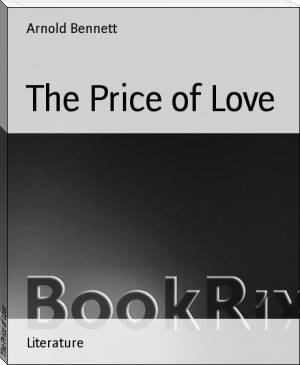The Price of Love - Arnold Bennett (electronic book reader .txt) 📗

- Author: Arnold Bennett
Book online «The Price of Love - Arnold Bennett (electronic book reader .txt) 📗». Author Arnold Bennett
"I'm out to-day for the first time. Had to come down here on a matter--"
Horrocleave spoke lower, and even more sardonically. "I hear ye're off to America."
Louis looked through the fretted partition at the figure of Krupp alone in the lounge. And Horrocleave also looked at Krupp. And Krupp looked back with his enigmatic gaze, perhaps scornful, perhaps indifferent, perhaps secretly appreciative--but in any case profoundly foreign and aloof and sinister.
"Well--" Louis began at a disadvantage. "Who says I'm off to America?"
Horrocleave advanced his chin and clenched a fist.
"Don't you go!" said he. "If ye did, ye might be brought back by the scruff o' the neck. You mark my words and come down to the works to-morrow morning--_to-morrow_, ye understand!" He was breathing quickly. Then a malicious grin seemed to pass over his face as his glance rested for an instant on Louis' plasters. The next instant he walked away, and Louis heard him at the cloak-room counter barking the one word, "Mackintosh."
Louis understood, only too completely. During his absence from the works Horrocleave had amused himself by critically examining the old petty-cash book. That was all, and it was enough. Good-bye to romance, to adventure, to the freedom of the larger world! The one course to pursue was to return home, to deny (as was easy) that the notion of going to America had ever occurred to him, or even the notion of putting up at the hotel, and with such dignity as he could assume to restore to Horrocleave the total sum abstracted. With care and luck he might yet save his reputation. It was impossible that Horrocleave should prosecute. And what was seventy odd pounds, after all? He was master of thousands.
If he could but have walked straight out of the hotel! But he could not. His dignity, the most precious of all his possessions, had to be maintained. Possibly Krupp had overheard the conversation, or divined its nature. He strolled back into the lounge.
"A benedictine," he ordered casually, and, neatly pulling up his trousers at the knee, sank into a basket-chair and crossed his legs, while blowing forth much smoke.
"Yes, sir."
When Krupp brought the tiny glass, Louis paid for it without looking at him, and gave a good tip. Ah! He would have liked to peer into Krupp's inmost mind and know exactly how Krupp had been discussing him with Jim Horrocleave. He would have liked to tell Krupp in cutting tones that waiters had no right to chatter to one customer about another. And then he would have liked to destroy Krupp. But he could not. His godlike dignity would not permit him to show by even the slightest gesture that he had been inconvenienced. The next moment he perceived that Providence had been watching over him. If he had gone to America unknown to Horrocleave, Horrocleave might indeed have proved seriously awkward.... Extradition--was there such a word, and such a thing? He finished the benedictine, went to the cloak-room and obtained his hat, coat, stick, and parcel; and the hovering Krupp helped him with his overcoat; and as Destiny cast him out of the dear retreat which a little earlier he had entered with such pleasurable anticipations, he was followed down the corridor by the aloof, disinterested gaze of the Swiss whose enigma no Staffordshire man had ever penetrated.
CHAPTER XVIII
MRS. TAMS'S STRANGE BEHAVIOUR
I
In the house at Bycars, where he arrived tardily after circuitous wanderings, Louis first of all dropped the parcel from Faulkner's into the oak chest, raising and lowering the lid without any noise. Once, in the train in Bleakridge tunnel, he had almost thrown the parcel out of the carriage on to the line, as though it were in some subtle way a piece of evidence against him; but, aided by his vanity, he had resisted the impulse. Why, indeed, should he be afraid of a parcel of linen? Had he not the right to buy linen when and how he chose? Then he removed his hat and coat, hung them carefully in their proper place, smoothed his hair, and walked straight into the parlour. He had a considerable gift of behaving as though nothing out of the ordinary had happened when the contrary was the case. Nobody could have guessed from his features that he was calculating and recalculating the chances of immediate imprisonment, and that each successive calculation disagreed with the previous one; at one moment the chances were less than one in a hundred, less than one in a million; at another they increased and multiplied themselves into tragic certainty.
When Rachel heard him in the lobby her sudden tears were tears of joy and deliverance. She did not try to restrain them. As she stole back to her chair she ignored all her reasonings against him, and lived only in the fact that he had returned. And she was triumphant. She thought: "Now that he is in the house, he is mine. I have him. He cannot escape me. In a caress I shall cancel all the past since his accident. So long as I can hold him I don't care." Her soul dissolved in softness towards him; even the body seemed to melt also, till, instead of being a strong, sturdy girl, she was a living tentacular endearment and naught else.
But when, with disconcerting quickness, he came into the room, she hardened again in spite of herself. She simply could not display her feelings. Upbringing, habit, environment were too much for her, and spontaneity was checked. Had she been alone with a dog she would have spent herself passionately on the dog, imaginatively transforming the dog into Louis; but the sight of Louis in person congealed her, so that she became a hard mass with just a tiny core of fire somewhere within.
"Why cannot I jump up and fall on his neck?" she asked herself angrily. But she could not.
She controlled her tears, and began to argue mentally whether Louis had come home because he could not keep away from her, or for base purposes of his own. She was conscious of a desire to greet him sarcastically with the remark, "So you've come back, after all!" It was a wilful, insensate desire; but there it was. She shut her lips on it, not without difficulty.
"I've kept some supper for you," she said, with averted head. She wanted to make her voice kind, but it would not obey her. It was neither kind nor unkind. There were tears in it, however.
They did not look at each other.
"Why did you keep supper for me?" he mumbled.
"I thought you might find you weren't well enough to travel," she answered thoughtfully, with her face still bent over the work which she was spoiling with every clumsy, feverish stitch.
This surprising and ingenious untruth came from her without the slightest effort. It seemed to invent itself.
"Well," said Louis, "I don't happen to want any supper." His accent was slightly but definitely inimical. He perceived that he had an advantage, and he decided to press it.
Rachel also perceived this, and she thought resentfully: "How cruel he is! How mean he is!" She hated and loved him simultaneously. She foresaw that peace must be preceded by the horrors of war, and she was discouraged. Though determined that he should not escape from the room unreconciled, she was ready to inflict dreadful injuries on him, as he on her. They now regarded each other askance, furtively, as dire enemies.
Louis, being deficient in common sense, thought of nothing but immediate victory. He well knew that, in case of trouble with Jim Horrocleave, he might be forced to humble himself before his wife, and that present arrogance would only intensify future difficulties. Also, he had easily divined that the woman opposite to him was a softer Rachel than the one he had left, and very ready for pacific compromise. Nevertheless, in his polite, patient way, he would persist in keeping the attitude of an ill-used saint with a most clear grievance. And more than this, he wanted to appear absolutely consistent, even in coming home again. Could he have recalled the precise terms of his letter, he would have contrived to interpret them so as to include the possibility of his return that night. He fully intended to be the perfect male.
Drawing his cigarette-case and match-box from his hip pocket, by means of the silver cable which attached them to his person, he carefully lit a cigarette and rose to put the spent match in the fire. While at the hearth he looked at his plastered face in the glass, critically and dispassionately, as though he had nothing else in the world to do. Then his eye caught some bits of paper in the fender--fragments of his letter which Rachel had cast into the fire and on to the hearth. He stooped, picked up one white piece, gazed at it, dropped it, picked up another, gazed at it, dropped it fastidiously.
"Hm!" he said faintly.
Then he stood again at his full height and blew smoke profusely about the mantelpiece. He was very close to Rachel, and above her. He could see the top of her bent, mysterious head; he could see all the changing curves of her breast as she breathed. He knew intimately her frock, the rings on her hand, the buckle on her shoe. He knew the whole feel of the room--the buzz of the gas, the peculiarities of the wall-paper, the thick curtain over the door to his right, the folds of the table-cloth. And in his infelicity and in his resentment against Rachel he savoured it all not without pleasure. The mere inviolable solitude with this young, strange, provocative woman in the night beyond the town stimulated him into a sort of zest of living.
There was a small sound from the young woman; her breathing was checked; she had choked down a dry sob. This signal, so faint and so dramatic in the stillness of the parlour, at once intimidated and encouraged him.
"What have you done with that money?" he asked, in a cold voice.
"What money?" Rachel replied, low, without raising her head. Her hand had ceased to move the needle.
"You know what money."
"I took it to Julian, of course."
"Why did you take it to Julian?"
"We agreed I should, last week--you yourself said so--don't you remember?" Her tones acquired some confidence.
"No, I don't remember. I remember something was said about letting him have half of it. Did you give him half or all of it?"
"I gave him all of it."
"I like that! I like that!" Louis remarked sarcastically. "I like your nerve. You do it on the sly. You don't say a word to me; and not content with that, you give him all of it. Why didn't you tell me? Why didn't you ask me for the money?"
Rachel offered no answer.
Louis proceeded with more vivacity. "And did he take it?"
"I made him."
"What? All of it? What reason did you give? How did you explain things?"
"I told him you'd had the rest of the money, of course, so it was all right. It wouldn't have been fair to him if some one hadn't told him."
Louis now seriously convinced himself that his grievance was tremendous, absolutely unexampled in the whole history of marriage.
"Well," said he, with high, gloomy dignity, "it may interest you to know that I didn't have the





Comments (0)